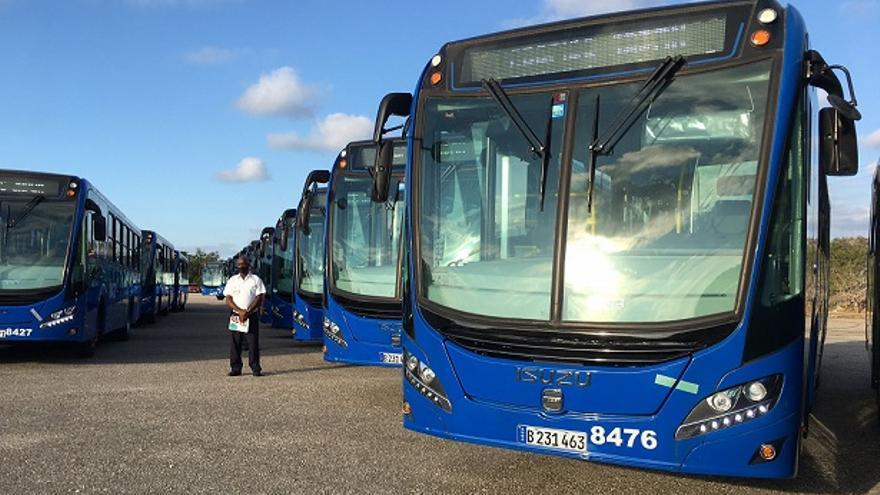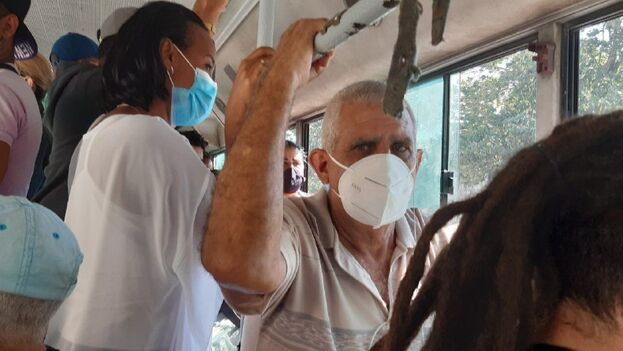
![]() 14ymedio, Natalia López Moya, Havana, 1 February 2022 — “Well, finally the new buses, what? Are they running or not?” a passenger asked the driver on the A40 route last Tuesday, arriving in Guanabo, where the journey ends. “They say Saturday,” he replied. Skeptical, a girl who was about to get off murmured: “Everyone knows how things work in this country, I doubt very much that we will see them anytime soon.”
14ymedio, Natalia López Moya, Havana, 1 February 2022 — “Well, finally the new buses, what? Are they running or not?” a passenger asked the driver on the A40 route last Tuesday, arriving in Guanabo, where the journey ends. “They say Saturday,” he replied. Skeptical, a girl who was about to get off murmured: “Everyone knows how things work in this country, I doubt very much that we will see them anytime soon.”
So far, the passenger’s prediction is fulfilled. The 84 Japanese buses that arrived on January 13 to renew the beleaguered Havana fleet are still not circulating despite the fact that the governor of Havana, Reinaldo García Zapata, asked to speed up putting them in service.
The terminal of the beach town of Guanabo, located in the municipality of Habana del Este, is one that will benefit the most from the acquisition of the new Isuzu models, since of the 84 Japanese buses, 59 are destined for this base.
A week ago, the A40 line stop located in front of the Havana Wall roundabout, on Desamparados street, was overwhelmed with people. Everyone waited with uncertainty for one of the brand new buses to arrive at any moment, but the same old ones kept showing up.
Already inside one of the old units, visibly deteriorated, the problems began, this time due to capacity. At the stop located in front of the Palacio de Bellas Artes, a transport inspector stopped the bus and demanded that the driver who stopped board more passengers.
“The bus is already full and we are in a new wave of covid,” the driver replied, but the inspector, standing in front of the bus and hitting the vehicle with his fist, insisted on increasing the number of passengers.
A police officer who was heading to her house made her way from the back of the vehicle to try to calm things down. Two plainclothes officers also ran to the scene to help avoid a fight breaking out.

The altercation ended when the driver, very upset, ended up opening the doors for everyone waiting at the stop to enter. “Let everyone get on and now. Let’s die with the omicron,” he protested before starting off visibly grumpy. The passengers, overwhelmed by the crowd, hoped that the journey would be short. “I hope that it won’t be long before they put the new buses on, because we look like sardines in a can,” said one of them.
At the height of Alamar, after about 30 minutes of travel, a worker from the company got on and told the driver that the new vehicles from Japan would be working on Saturday, January 29, although he had doubts about it. “We’ll see, because there aren’t even enough drivers,” he said. According to what he had heard, the transport company was trying to solve the problem by looking for drivers from other bases who were classified as ’interrupted’ (temporarily unemployed workers), “although it is difficult for many to show up, because of how far Guanabo is from the rest of the city.”
Finally, on Friday, January 28, and coinciding with the birthday of José Martí, the official press published an article about the long-awaited buses with the title ’Urban buses donated by Japan are ready’. At the event were Hirata Kenji, Japanese ambassador to the island, and the governor of Havana, who presided over the formal delivery of the Isuzu fleet on the Tarará esplanade.
Symbolically, the keys to ten of these vehicles were handed over at the event.
But Saturday arrived and at the A40 stop there was no trace of the desired buses. “They waited for Martí’s birthday to deliver the buses. They make a circus of everything, to see if it is true that they are rolling today,” said a passenger waiting for the vehicle.
Long minutes later, a bus made the turn around the roundabout, again one of the old ones, to the disappointment of those who were there. A pastry vendor stationed in the area of the crowded stop explained to those present that, despite the fact that a transport inspector had assured him that the new buses would start rolling this Saturday, he had been there for hours and none had appeared. The driver of the route admitted not knowing anything about the new vehicles.
Felicia, an EcoTaxi tricycle driver in the capital, says that last weekend she preferred to rent a car to go with her friends to Guanabo beach, even though they charged 100 pesos per person. “We got to the stop, and it was insane, there were a lot of people,” she explains. “If the problems of transportation and food are not resolved in this country, a social explosion larger than that of 11J will arrive very soon.”
This Monday, the official press mentioned the issue again to affirm that they are working “intensely” to put new vehicles in service as soon as possible. The note explains that the technical inspections and other operational requirements have been carried out without problems, however, the obstacle lies in the poor training of the personnel in charge of driving the vehicles.
The mystery about when they will start circulating is still hanging. “The new buses haven’t come out. I imagine they won’t take that long, but I don’t even know when they’ll come out,” explained a worker at the Guanabo bus stop this Monday to 14ymedio. “We have to wait for the official information that announces the day to start up. For now, we have to keep going with the old ones.”
*Translator’s note: Bus, or in Cuban Spanish “guagua” is a feminine noun.
____________
COLLABORATE WITH OUR WORK: The 14ymedio team is committed to practicing serious journalism that reflects Cuba’s reality in all its depth. Thank you for joining us on this long journey. We invite you to continue supporting us by becoming a member of 14ymedio now. Together we can continue transforming journalism in Cuba.
